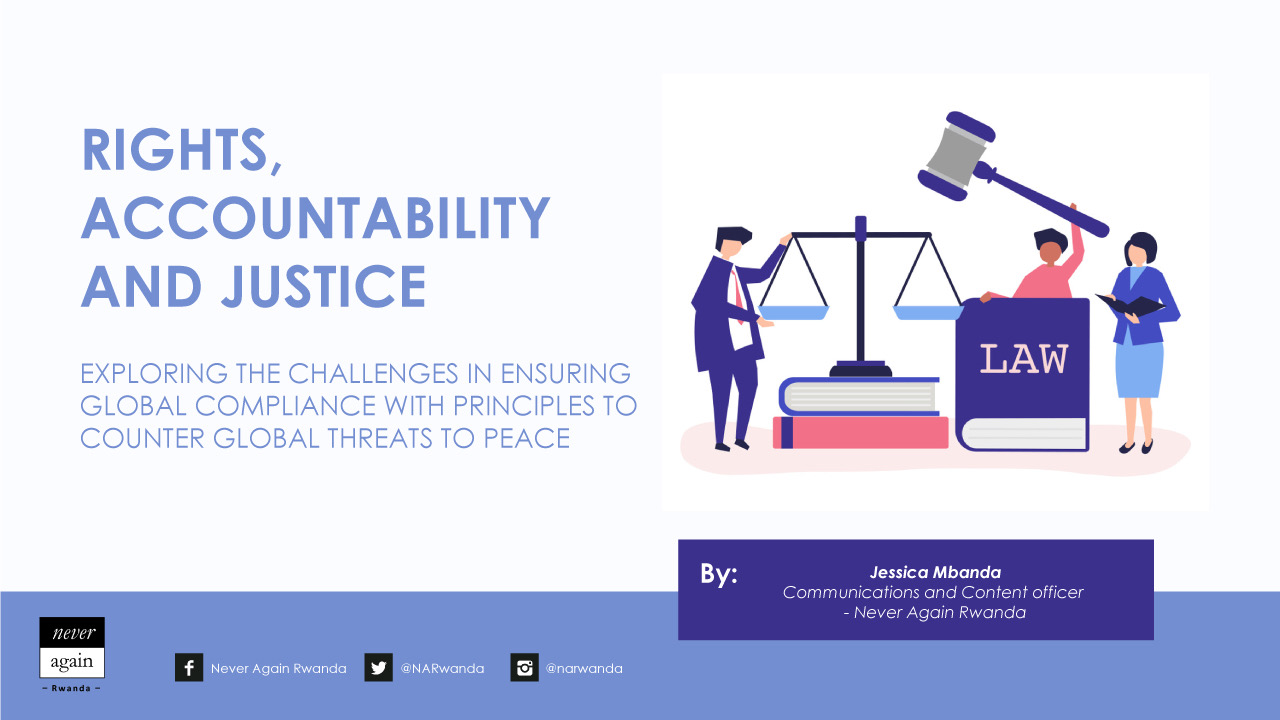Exploring the challenges in ensuring global compliance with principles to counter global threats to peace.
Rights, accountability, and justice are critical for the prevention of conflict and violence, the building and sustaining of peace, and achievement of inclusive development. A lack of these principles leads to lawlessness that is prevailing across the world and destabilizing states and regions, thus threatening international peace and security. Genocide, war crimes and crimes against humanity and other gross violations of human rights continue to undermine the fabric of entire societies, thus underlining the dire need to ensure global compliance with the principles of rights, accountability, and justice.
Challenges in ensuring global compliance
One of the major challenges in ensuring global compliance, especially to the principle of rights is the difficulty in establishing a universal interpretation of human rights and what constitutes a breach across regions and cultures at global level. Human rights are appreciated differently in light of differences in economic, political, social and cultural character of countries, thus resulting in varying perceptions of human rights between Western and non-Western societies.
In addition to the aforementioned subjectivity of human rights, another challenge in ensuring global compliance to the principles of rights, accountability and justice is that international laws, unlike domestic laws are not enforced by a coercive sovereignty; meaning there is no global enforcement mechanism to ensure that states comply with these laws. Despite the increasing prevalence of international human rights treaties posing legal obligations on states, enforcement mechanisms are still lacking at the global level. In this case one might consider the International Criminal Court (ICC) as a global accountability and justice-serving mechanism to ensure global compliance to human rights; however, this court has its shortcomings and only deals with the grossest of violations such as genocide and war crimes.
As a result, the task of monitoring states’ compliance to the principles of rights, accountability and justice strongly relies on self and peer reporting. The former creates a loophole where executive branches of states that are the prime violators have the option not to provide the information to international organizations and thus avoid consequences. Even though international institutions are often able to induce states that have ratified the concerned treaties to comply by exerting pressure, and possibly sanctions, there is no global legally binding enforcement mechanism to hold states accountable for violating their international human rights obligations and other global threats to peace.
Additionally, the ideal of human rights and framework of international human rights law is contrary to the traditional concept of state sovereignty and thus considered subordinate to it. For international human rights to be truly effective, national courts, governments and parliaments have to ensure that they adopt them into legislation, and civil societies have to mobilize and hold authorities accountable on that basis.
There is a lack of interest for the states. Since a violation by a state of the rights of its own citizens does not infringe on the national interests of other parties to the agreement, the other parties are not compelled to scrutinize the violations. This has been recorded in the past in countries like Rwanda during the 1994 Genocide against the Tutsi, where other states failed to intervene and call for the former Genocidaire government to cease the violations and be held accountable for their actions. The failure of the other states to respond in a timely manner was ascribed to a lack of their self-interest represented in Rwanda at the time as guided by their foreign policies.
Opportunities for change
To successfully ensure global compliance with these principles, states can integrate the pursuance of these principles into their national policies and the various policies in their international relations. As for the enforcement of compliance, individual states and other actors in the international fora ought to raise awareness and call for accountability by generating pressure.
However, it is important to acknowledge that the improvement of rights and accountability in a state is more dependent on the states’ will.
For a successful transformative process and to address the current challenges to global compliance to human rights, accountability and justice, it is imperative to examine the patterns of past human rights violations in order to avoid letting the same violations go unaccounted for. Additionally, there is a strong need to find a framework that fits both the Western and non-Western perceptions of human rights in order to find a common ground and avoid policing of non Western states to adhere to Western models that do not fit their political, social and cultural context.
We should keep in mind that it is easier said than done when it comes to ensuring global compliance to the principles of rights, accountability and justice especially given the complexities that are linked with establishing a global legally binding enforcement mechanism while respecting state sovereignty. Knowledge and capacity must be combined for effective implementation. Although capacity and knowledge on their own will not suffice where a government lacks political commitment to hold violators of these principles accountable. States need to develop their own capacity to investigate and prosecute violations of rights and injustice. If need be, states should set up national commissions of inquiry to respond to serious violations of rights and injustice. The international community can play a role in this process by supporting national accountability efforts without undermining them.
Global compliance to the principles of human rights, accountability and justice constitutes a central plank of countering global threats to peace.
Jessica Mbanda
Communications and Content officer – Never Again Rwanda


